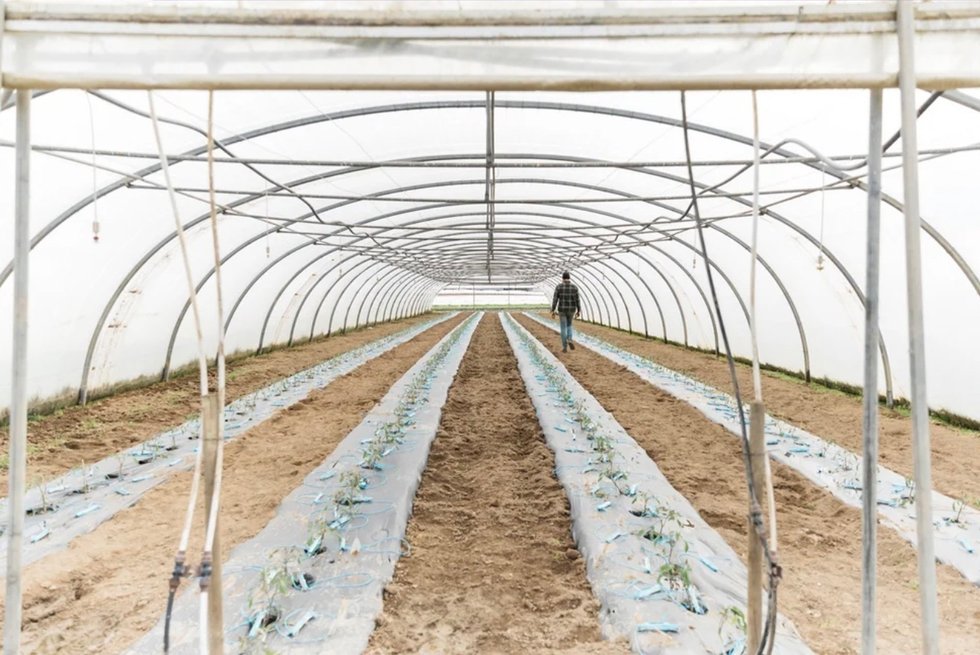When your workplace is literally toxic — but you’re a kid
Nov 07, 2023
10 mins


Journalist and translator based in Paris, France.
In the United States, children are not supposed to work with meat slicers or corrosive cleaning products or for more than three hours on a school day — yet they are doing just that and more. The number of unaccompanied minors entering the country tripled in the past five years, and these children are finding themselves victims of increasing child labor violations. All over the country — in hotels, farms and the factories of Fortune 500 companies — kids are scrambling to make money in alarming conditions, far from the classic American lemonade stands intended to teach youngsters how to pull themselves up by their bootstraps.
To better understand how this surge in child labor affects children’s lives and the economy, Welcome To The Jungle spoke with Reid Maki, the coordinator of the Child Labor Coalition, a non-partisan group that is concerned with the health and welfare of children in the US and abroad. Until 2006, he worked for the Association of Farmworker Opportunity Programs (AFOP), which helps migrant and seasonal workers and their families, where he was involved in some field investigations. In our interview, Maki describes how kids end up doing the grueling work American adults don’t want to take on, the struggle to protect underage workers and how ending child labor could benefit the entire job market.
How did you get into child labor rights?
I took a writing job at the Association of Farmworker Opportunity Programs AFOP almost 30 years ago. They’re active in the child labor space, but their main thrust was helping to move farmworker families out of extreme poverty through job training by, for example teaching a farmworker making $17,000 a year to be a welder, which allows them to make $50,000 a year with benefits and vacation.
But we, the advocates at AFOP, realized that only a small number of lives were being transformed every year: Job training is expensive and the program faced limits on the numbers of farmworkers that could be reached. And that has an impact on their kids’ ability to stay in school. Farmworkers in the US make so little money that they bring their kids out into the fields. There’s a payment system called “piece rate,” which is when you get paid by the bucket that you pick. The pay was so low that parents were bringing their kids out into the fields to work and had migrated with them, too.
Migrating from where?
Some kids came up from Mexico and Central America to do this work, including some unaccompanied minors. But there are also a lot of kids that were born to immigrant families doing the work, too. . . . There are kids that are as American as anybody: They speak unaccented English, they go to school, they thoroughly identify as American, but they’re also from Mexico or elsewhere in Central America. And these kids were dropping out of school at a fairly dramatic rate. We thought that two-thirds of the kids weren’t getting through high school, although the data is quite fuzzy on this. The farmworker community as a whole is really exploited. Just denied a lot of basic labor law protections, making it really hard to unionize the workers.
So we recognized that something systemic had to be done. My title was communications director, but I ended up doing a lot of child labor advocacy, such as talking to Congress about these issues. I eventually began working for the Child Labor Coalition, which I now run. We started trying to get the laws changed because there are glaring exemptions to child labor law in the US. Most of our child labor law comes from the Fair Labor Standards Act of the 1930s, and that did a pretty good job of making it illegal to work in factories and coal mines and places like that — but it has these glaring exemptions for agriculture.
It allows a kid who is 12 to work unlimited hours in the field as long as they’re not missing school — truancy laws are pretty strong. But in the summers, they can work 80-hour weeks — and a lot of these kids do. Because there’s such urgency to get the crops when they’re ripe, farm owners want the workers there until the last cucumber is picked. We saw really horrible conditions. Adults and kids are bent over picking up fruits and vegetables that, when they’re turned into a bucket, get quite heavy. Then the buckets have to be exchanged into sacks or taken to a truck. United Farm Workers has videos of farmworkers running to the truck with 10- or 15-pound buckets because they’re so desperate to get their wages up. Conditions are horrendous and we’ve been trying for three decades to get Congress to fix this.
What’s stopping the government from fixing this?
Part of the reason is that there’s a very, very strong farm lobby in the US that fights almost any effort to regulate farms. We witnessed this in about 2010-11 when we tried to help the Obama administration implement occupational safety rules for kids who work on farms — such as limiting kids to working at a height of 6 feet instead of the current 20 feet, or [saying] kids cannot pick tobacco. That ended up being hotly contested by the farm lobby.
Another factor is simple economics: The Department of Labor (DOL) has 794 enforcement agents charged with supervising and monitoring 9.8 million workplaces in the US. No wonder they’re missing a lot. The Biden administration recently submitted a request to Congress that had $100 million for increased child labor enforcement. There’s really two problems with the enforcement issue. One, you need the agents to find the cases. But then once you find the cases, you have to litigate them, issue findings, tell the companies what they need to pay. And sometimes companies are going to fight back. So you need to increase the capacities of the solicitor’s office, the lawyers and the DOL to help litigate these cases. And that’s what that $100 million would go to.
Another aspect is that there’s a philosophical divide between the right and the left about parental rights. I’m part of a child rights group, and we talk about this a lot. Essentially, we believe that children have fundamental rights. Kind of the same things that are in the US Constitution: Life, liberty and the pursuit of happiness – the right to not be damaged. The right wing tends to have a very strong belief in unfettered parental rights, that parents always make the best decisions for their children.
Most parents do love and care for their kids, and don’t want to make bad decisions, but they’re not armed with the knowledge that experts have. I spoke to the parents of a kid who lost half his hand in a work accident. They thought he was doing non-machinery tasks – they had no idea he had a chance of getting hurt that traumatically. I’ve read a lot of death reports of teenagers in my 30 years in the field. Kids figure out how to get hurt in the most alarming, dramatic, catastrophic ways that parents would never think of. In agriculture, we were losing a few kids a year to grain silos. Who thinks of that? Parents love their kids, but they’re not armed to make decisions that policymakers should be making.
What effects do these agricultural jobs have on children?
Musculoskeletal injuries are a big concern, and the possibility of traumatic injuries. And we worry about the accumulation of pesticides in kids’ bodies. I’ve worked with a lot of people who are from farmworker families – and this is anecdotal – but it does seem that their families are riddled with cancer. We think that it’s probably from all the pesticides they absorb while working. There’s a bill that would ban child labor in US tobacco, which is a really nasty crop that makes children sick with green tobacco sickness, which is basically nicotine poisoning.
Health, financial exploitation – it just seems like a really unfair burden to place on young children. We are discriminating against a subset of children who happen to be immigrant and brown and poor, and we’re really exploiting them for their labor. They’re basically keeping down the prices of US fruits and vegetables because they’re contributing so much and often make less than adults. Yet it’s damaging their health and safety and education. The average person doesn’t know that their fruits and vegetables might have been picked by children.
Can you give some examples of child labor issues outside of farming?
The Trump administration, a few years back, decided that it was time for teenagers who worked in nursing homes to operate patient lifts by themselves with no adult supervision, which we thought was madness because those things can tip over with the elderly patients in them. It endangers the patients and the teenagers.
We’ve gotten involved in a bunch of issues like that. We started raising alarms about kids working in meatpacking plants in 2008 when there were immigration raids. This was, I think, the end of the Bush administration. There was an immigration raid in Iowa, and they found a bunch of undocumented immigrants working in this meatpacking plant, and they found 50 teenagers working there. Teens are not allowed to work in those kinds of factories, as it’s dangerous work. So we tried to raise alarm bells, but nothing really came out of that until last year when the DOL found 102 children working in 13 meatpacking facilities in eight states under pretty awful conditions.
The kids were cleaning meatpacking plants, and that entailed working with caustic chemicals. One of the kids got burned by the chemicals and their teacher reported it to the US Department of Agriculture, and that started this big investigation. And the kids were working the graveyard shift. They were 13, 14 years old when they have to be 18 to legally work there. So you’ve got kids five years younger than the minimum age. They had fake IDs, of course. But how many 13-year-olds look 18? They were cleaning with pressure hoses, which are very dangerous. They were cleaning the saws that cut apart animals. They were working in inches of water, and blood, and body parts, and pieces of animals that came off the saws. So pretty horrific work. Then the kids were trying to go to school, because they’re required to go, and falling asleep in class. Some of the news reporting about this shows pictures of these kids — and they are tiny.
The largest numbers of under-18s are probably in restaurants and retail. But this is only child labor if the kid is too young to be working, which we don’t see a huge number of. What we’ve mostly seen coming out of the Biden administration’s DOL is a lot of hours violations. And that becomes a concern because academic findings say that when kids work more than 20 hours a week, their grades start to drop. We know from data that kids who do drop out of high school earn less over their career, so there’s a long-term impact.
There was a case a few months ago in Kentucky where the DOL found more than 300 kids working more hours than they should in McDonald’s – in some cases operating dangerous machinery like deep-fryers a prohibited task for children under 16. There were a couple of kids who were working the drive thru in a McDonald’s, and they were ten years old. And it was 2am.
I think what happened is that their parents probably had no daycare and took them to work – and you can do that. You can take your kid to work. You could put them in a booth in the corner of a McDonald’s and give them a pillow or a coloring book and let them rest. But once you bring them into the kitchen with all this dangerous equipment, and then you allow them to work, then you’re breaking the law. So I do feel bad for the parents in that case. But somebody needs to explain to them that if you have no daycare and you have to take them to work, you just can’t let them do anything.
Underage workers were recently found in some of the Hyundai auto part suppliers in Alabama. I have a fear that all this reporting is the tip of the iceberg and the numbers could be significantly higher than people are assuming.
I’ve read reports that US child labor is rising. Apparently the DOL found the number of children employed illegally rose 37% in 2022 alone. What’s causing this?
The Biden administration’s DOL cares a lot more about this issue than the Trump administration did. So we think that explains some of the numbers going up. But I think it’s a combination of increased attention and increased numbers. The Economic Policy Institute is a partner of ours that has done a lot of work on the state efforts to weaken child labor laws that have occurred, and one of the stats that they’ve come up with is almost a 300% increase in violations found since 2015.
And there seem to be more unaccompanied minors coming into the States. We think 130,000 kids came over by themselves last year, and these kids are desperate. They came over with the express purpose of sending money back, usually to their families. So they’ll take any job. I wonder if [the kids] even know that some of these jobs are actually illegal.
We also think there are more kids working because of this perceived labor shortage that’s happening in the US. But why balance it on the backs of vulnerable teen workers? You can raise wages. You could ask Congress for comprehensive immigration reform because with the tightening of the border came the loss of workers to fill jobs that Americans just don’t want to do.
Are all these kids undocumented immigrants?
They’re undocumented but they have a semi-legal status in the US because they’ve been processed. So their presence is acknowledged, and they’re waiting for adjudication. I’m not nearly an expert on all of the legal aspects of unaccompanied minors, but I think that we’ve seen some major, major flaws in the way The US government has tracked these kids to make sure that they’re not being exploited. Apparently, they’ve found a fairly large number of kids have been released to the same sponsor. I think the system hopes that the kids are released to an uncle or aunt or cousin, and that the person will help look after them and make sure they’re not exploited. But when you see a bunch of kids released to the same sponsor, then it seems like they’re being trafficked. It’s worrisome to throw that term around, but they could be exploited by somebody who is demanding part of their salary.
Does their semi-legal status keep them working in illegal conditions? For example, are they worried they or their families will be deported if they report their workplace?
It’s hard to know. I think it’s primarily just the desperate need for money because they’ve got to send it back to their families. But a lot of them also owe money to traffickers, coyotes that got them across the border and are now demanding they pay up. If some of these sponsors are exploiting them, they might have to give money to them as well. So they’re desperate. Desperate for money.
We want kids to thrive. We’re okay with them working in a safe job as long as it’s 18 hours a week. Some kids are working for school clothes or to buy their first car; others are from destitute families that need the money. We don’t want to see them sacrifice their education for temporary needs.
We certainly don’t want anybody to starve: If the only way a family can survive is for the child to work, we kind of understand it. But at the same time, there’s an estimated 160 million children in the world trapped in child labor. But there are more than that number of adults who are unemployed. All of those children could focus on school if financial resources were fairly allocated, but they’re not. [Social reformer] Grace Abbott once said that if you allow child labor to be the antidote to poverty, then you’ll have both forever.
Photo: Welcome to the Jungle
Follow Welcome to the Jungle on Facebook, LinkedIn, and Instagram to get our latest articles every day, and don’t forget to subscribe to our newsletter!

More inspiration: Society for workers

How auto unions are advancing the idea of a shorter working week for all
As support for the 4-day workweek keeps gaining steam, the industry that ushered in the 5-day workweek is still at the forefront
Nov 27, 2023

“Many American workers and families break even at best.”
An economics reporter breaks down the complex landscape of today's economy.
Nov 23, 2023

So, are robots really coming for our jobs? A conversation with futurist Gary Bolles
Fears of an AI apocalypse loom large, but what are experts saying about the future?
Mar 07, 2023

With a universal income, will we stop working?
Universal income is gaining traction in Europe, but questions about essential jobs remain…
Dec 21, 2022

Will working for a DAO be better than a corporate job?
Some say it's the democratization of work. Others warn of toxic power structures... so what's the deal with decentralized autonomous organizations?
Nov 10, 2022
The newsletter that does the job
Want to keep up with the latest articles? Twice a week you can receive stories, jobs, and tips in your inbox.

Looking for your next job?
Over 200,000 people have found a job with Welcome to the Jungle.
Explore jobs